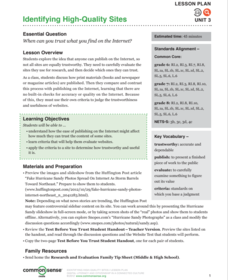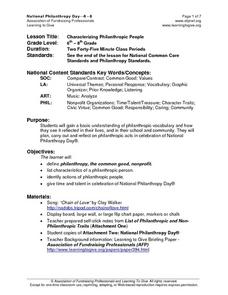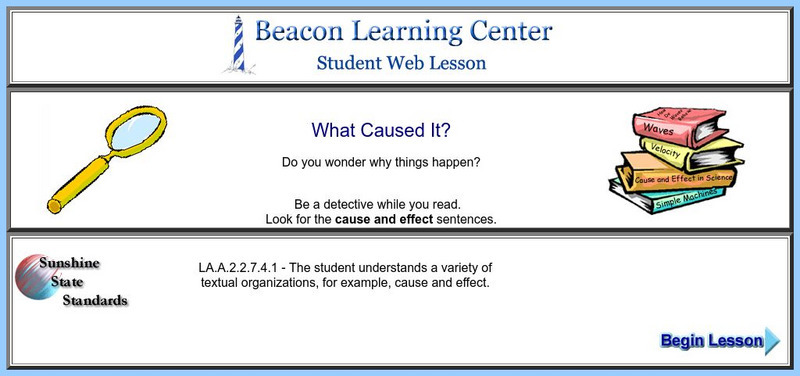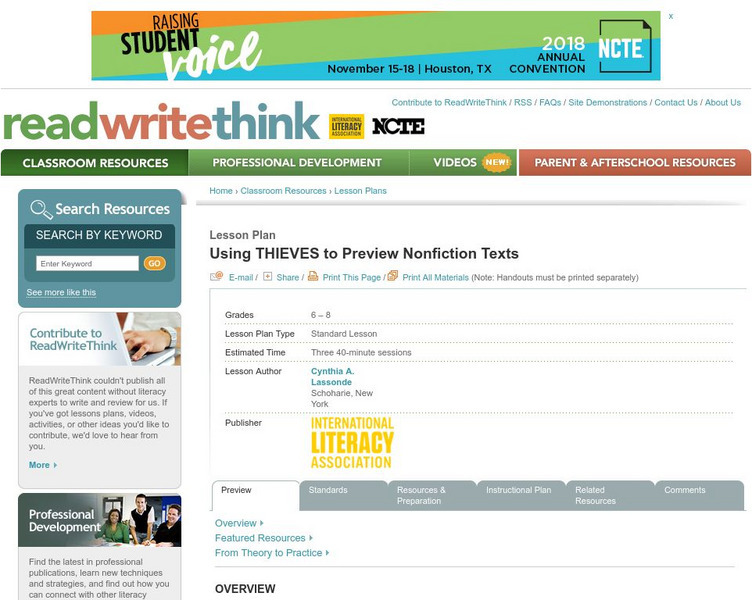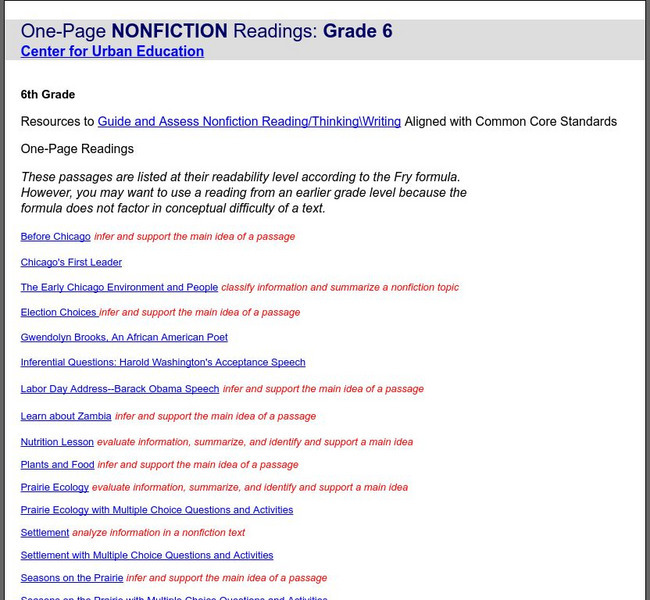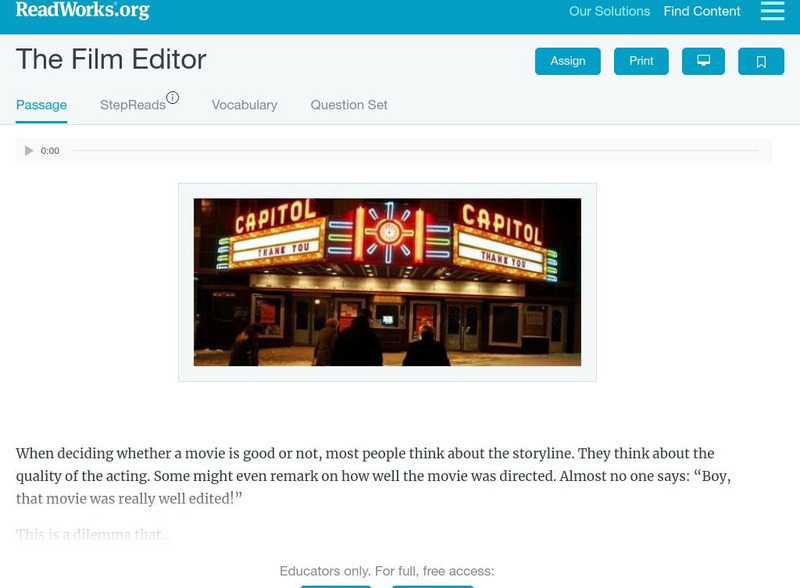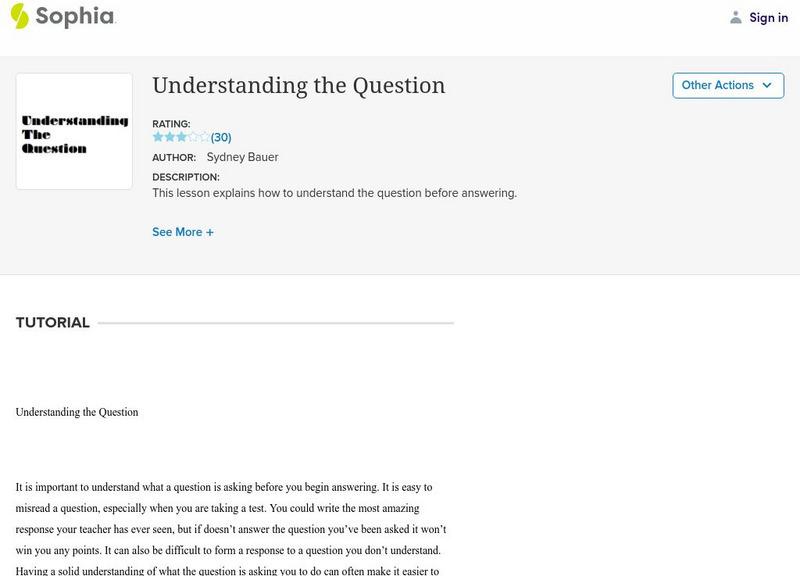Common Sense Media
Cyberbullying: Be Upstanding
Peers discuss cyberbullying and how they can defend their friends that may be bullied online and offline. They discover the value in showing empathy for those who have been cyberbullied. Class members then generate multiple solutions for...
Common Sense Media
Identifying High-Quality Sites
Use a Huffington Post article focused on false pictures of Hurricane Sandy to launch a discussion about the reliability of online information. Groups compare and contrast how print and broadcast media regulate data gathering with the...
Curated OER
Pictures, Photographs, and Captions
"How do photographs contribute to an autobiography?" Laurence Yep's The Lost Garden provides learners with an opportunity to examine how photos and their captions contribute to and clarify events in a story. Class members use expressive...
Curated OER
What are the Main Ideas?
Prior to beginning Rosa Parks: My Story by Rosa Parks, model for your class members how to determine the main idea of a text. Exercepts from another story are provided to use for the demonstration. The focus then shifts to Rosa Parks'...
Curated OER
Lesson One: Characterizing Philanthropic People
Familiarize your class with philanthropy and involve individuals in philanthropic activities. First, determine the traits of philanthropic people. Class members attach sticky notes with character traits written on them to each side of at...
Curated OER
Just Lookin' For a Home
What is a boll weevil? Your class can find out that and more by following the activities included here. Pupils read an article, sing a boll weevil song, add to the song with their own original lyrics, illustrate the song, study the...
PBS
Pbs Learning Media: Walmart Middle School Litercy Initiative
Interactive, student-paced lessons on such literacy skills as categorizing, comparing and contrasting, summarizing, evaluating, determining cause and effect, using text features, connecting, inferring, sequencing, understanding problems...
Beacon Learning Center
Beacon Learning Center: What Caused It?: Student Web Lesson
Students are asked to be detectives while they read and to look for the cause/effect sentences in the paragraphs. In this lesson, students read paragraphs and answer questions about it by either typing in their responses or selecting...
Polk Brothers Foundation Center for Urban Education at DePaul University
De Paul University: Center for Urban Education: Nonfict Readers Analyze Structure/views[pdf]
This graphic organizer contains questions for students as they analyze any nonfiction text. Students will read closely to determine the text's structure, viewpoint, and tone. This graphic organizer is a copyrighted material that may be...
Polk Brothers Foundation Center for Urban Education at DePaul University
De Paul University: Center for Urban Education: Comprehensive Questions: Nonfiction [Pdf]
Questions are provided to help students determine the main idea, topic, and fact versus opinion of a nonfiction piece. Students are prompted to write a summary of an informational text.
Other
Curriculum Associates: Determining Theme or Central Idea [Pdf]
In this reading comprehension lesson unit, students are guided in learning how to find the main theme or idea of a text and understanding how details in the text convey that. Includes lots of exercises and examples, as well as...
ReadWriteThink
Read Write Think: Using Thieves to Preview Nonfiction Texts
Contains plans for three lessons that introduce a nonfiction prereading strategy with the acronym THIEVES, which stands for Title, Headings, Introduction, Every first sentence, Visuals and vocabulary, End Questions, and Summary. In...
ReadWriteThink
Read Write Think: Playing With Genre Through Newspapers and Short Stories
Contains plans for three lessons that ask students to compare narrative writing (short stories) to expository writing (news articles) in order to understand what makes each genre unique. In addition to objectives and standards, this...
Other
Academic Reading: Sample Task [Pdf]
This Academic Reading task provides a practice assessment for identifying headings and subheadings. In the task, students must read the selection and then determine the best subheading for each of the sections.
Polk Brothers Foundation Center for Urban Education at DePaul University
De Paul University: Center for Urban Education: One Page Nonfiction Readings: Grade 6
This site contains 17 nonfiction articles that are appropriate for students with a 6th grade reading level, as measured by the Fry Formula. Questions for each passage are provided. Graphic organizers are available for these copyrighted...
ReadWriteThink
Read Write Think: Scaffolding Summarization With Fishbone Mapping
Lesson that teaches students how to find important and significant information while reading text. After locating information through strategies, students learn how to summarize content-area text. A downloadable fishbone template is linked.
University of Houston
University of Houston: Extra! Extra! What's the Big Idea?!
Get the feel of running a newspaper by selecting articles and pictures. If you are interested in checking out real newspapers, there is a clickable list of online newspapers for younger readers.
Read Works
Read Works: Passages: The Film Editor
[Free Registration/Login Required] Students read a nonfiction text about the job of a film editor and answer questions about comprehension, supporting details, inferencing, main idea, and more. Links to a paired text and paired text...
Read Works
Read Works: Passages: The Process of Acting
[Free Registration/Login Required] Students read a nonfiction text about what it takes to be an actor and answer questions about comprehension, main idea, supporting details, vocabulary, transitions, and more. Links to a paired text and...
Sophia Learning
Sophia: Understanding the Question
This lesson focuses on how to understand a reading question; it details three main parts: look for content and process words, state the question in your own words, and restate the question as a statement. It explains each and provides...
Polk Brothers Foundation Center for Urban Education at DePaul University
De Paul University: Center for Urban Education: Comprehensive Assessment: Nonfiction [Pdf]
Questions are provided to help students determine the main idea, topic, purpose, and opinion of a piece of nonfiction. Students are prompted to write a summary of the informational text.
Texas Education Agency
Texas Gateway: Summarize Informational/expository Text (English 6 Reading)
[Accessible by TX Educators. Free Registration/Login Required] Learn how to summarize the main ideas and supporting details in text and understand that a summary does not include opinions.
Texas Education Agency
Texas Gateway: Summarize Informational/expository Text (English 7 Reading)
[Accessible by TX Educators. Free Registration/Login Required] Learn how to evaluate a summary of the original text for accuracy of the main ideas, supporting details, and overall meaning.
Texas Education Agency
Texas Gateway: Synthesize Ideas in Informational/expository Texts
[Accessible by TX Educators. Free Registration/Login Required] Learn how to synthesize and make logical connections between ideas within a text and across two or three texts representing similar or different genres (including literary...



